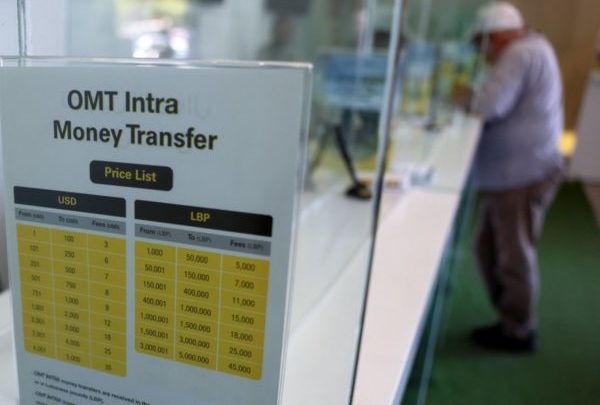Like many people in crisis-hit Lebanon, Elias Skaff used to wait for hours to withdraw cash at the bank but now prefers money transfer companies as trust in lenders has evaporated.
Anyone who relies on traditional banks to receive their money “will die 100 times before cashing it”, said Skaff, 50, who has survived Lebanon’s three-year-old economic downturn with the help of US dollar payments from a relative abroad.
Once the flagship of Lebanon’s economy, the banking sector is now widely despised and avoided after banks barred depositors from accessing their savings, stopped offering loans and closed hundreds of branches and slashed thousands of jobs.
Last month, a local man was widely cheered as a folk hero after he stormed a Beirut bank with a rifle and held employees and customers hostage for hours to demand some of his $200,000 in frozen savings to pay hospital bills for his sick father.
Increasingly, as Lebanon’s deep crisis shows no sign of abating, money transfer agencies are filling the gap, also offering currency exchange, credit card and tax payment services and even setting up wedding gift registries.
Skaff said he now receives his money via a Beirut branch of Western Union’s Lebanese agent OMT, which says it operates more than 1,200 branches nationwide and handles 80 percent of money transfers outside the Lebanese banking sector.
“We create services similar to those that banks provide at the request of our customers,” said OMT spokesman Naji Abou Zeid.

Lebanon has been battered by its worst-ever economic crisis since the financial sector went into meltdown in 2019. The local currency has lost more than 90 percent of its value on the black market, as poverty and unemployment have soared.
Angry protesters have often targeted banks, trashing their ATM machines with rocks and spray cans.
“We can’t even withdraw a penny” from the bank, said 45-year-old Alaa Sheikhani, a customer standing in line at an OMT branch.
“How are we supposed to trust them with our money?”
Elie, 36, who recently got married, said he used Whish Money, a Lebanese money transfer firm, to set up his wedding gift registry, something he said saved wedding guests time, hassle and money in fees.
“Rather than waiting for hours at the bank, which is often crowded, they can hand over the money to an agency,” said the man who asked not to be fully named. “In terms of time saved and costs, it’s incomparable.”
Whish Money’s marketing director Dina Daher said the company is winning customers by charging “zero fees” on Lebanese pound transfers.
Some companies are now even paying salaries through money transfer companies instead of banks.
“When the crisis began, we were forced to pay salaries in cash, and it was a waste of time,” because accountants had to count out large bundles of banknotes, said Rachelle Bou Nader, a human resources manager.
But now her firm, sporting goods retailer Mike Sport, pays its employees through Whish, allowing them to “withdraw their salary easily, in instalments, and free of charge”, said Bou Nader.
Sami Nader, director of the Levant Institute for Strategic Affairs, said remittances from the Lebanese diaspora have become crucial to help families weather the crushing economic crisis.
“Today, a young Lebanese employee living abroad won’t hesitate to send $100 to his parents because this sum now makes a difference,” he said.
Lebanese banks have drastically increased fees on the few services they still offer — including foreign currency transfers, now their only meaningful source of income — said Nader, who added that this has further fuelled the exodus to money transfer companies.
About 250,000 residents of Lebanon received remittances in the first half of 2022, according to OMT, up eight percent from the same period last year.
The World Bank has reported that Lebanon received $6.6 billion in remittances in 2021, one of the highest levels in the Middle East and North Africa.
Which transfer firm is right for you
It can be overwhelming to research your options of transferring money to or from another country. Many companies support moving money between countries and it’s important to understand the differences between the services those companies provide.
Here is a 10-point checklist below to determine which international money transfer service is right for you.
1- Frequency & Purpose. Some money transfer companies work well if you need to make a once-off large transfer, e.g. paying tuition or buying property. Other services were designed for small businesses to make frequent, small(er) transfers. So, when looking at the various options, the first thing you should do is determine how often you need to transfer money.
2-Transfer fees. To determine how expensive a certain service is, you must know the applicable fees. One way international money transfer firms make money, is by charging a transfer fee. The transfer fee is generally a flat fee . Some firms waive this fee entirely. Certain providers offer services and tools to help detect optimal timing for the transfer. Depending on the transfer amount and service quality savings might outweigh fees.
3-Exchange rate. If you’ve ever been inside a bank or store that offers currency exchange, you’re probably familiar with the exchange rate concept. Exchange rate is the general way to express how much currency you’ll get when you exchange it for another currency. Exchange rates as set by the banks and are too complicated in Lebanon for this reason the exchange rate you’ll receive from a money transfer service will almost certainly be more favorable to you if it is based on the black market rate
4-Recurring transfers. There are many reasons for making recurring international money transfers. Maybe you need to make a regular monthly payment . It can be a pain to have to enter the same exact information every month to move money. So, some international money transfer firms make it easy to set up a recurring payment. Check and see if a particular service offers “repeat” or “recurring” transfers.
5-Sending and receiving options. When you’re sending money internationally, you can choose from a variety of different options. Some firms will let you drop off cash at a teller window. Most money transfer companies provide various options, like sending money off a credit or debit card, or making direct transfers from your bank account or stored value account. If you’re an online seller, you may benefit from a direct integration with eCommerce marketplaces that some transfer firms offer. Important to keep in mind is that sending money is just half the equation. You (or the recipient) will also have to find out how to release the money on the other end. Similar options exist on the receiving side, but they can sometimes be more restrictive. Be smart and find out upfront how it all works.
6- Transfer speed. Every international service transfers money at a different speed. To make things more complicated, the speed of a transaction can also depend on the currencies involved in the transfer. Make sure to check if a transfer service takes 0-1 days to deliver your money, or 2-3 days.
7-Transfer limits. Different firms have different policies when it comes to how much money you can transfer using their service. Some international money transfer firms don’t limit the amount you can transfer. Identify a service provider that works with customers with a profile similar to yours.
8- Special features. Because of the competitiveness of the money transferring field, some of the businesses offer special features that help them stand out from the competition. Some firms offer better exchange rates, waive transfer fees, and offer cash pickup options, hedging tools, and fixed exchange rates to pull you in as a customer.
9-Special offers. The international money transfer industry is becoming really competitive. New companies regularly enter the arena in search of your business. Some offer cash incentives to get you to sign up with them. Others use cash incentives to get you to refer your friends. If you want to take advantage of these offers, do a quick online search to see if a particular money transfer service offers this type of freebies.
10-Customer support. Finding an international money transfer firm with good customer support is a lot like buying insurance: you hope you’ll never need it, but when you do, you’re glad you have it. The best firms offer 24/7 service along with a variety of ways to contact them, including phone, email and chat.
AFP Barrons/ Ya Libnan


Leave a Reply
You must be logged in to post a comment.